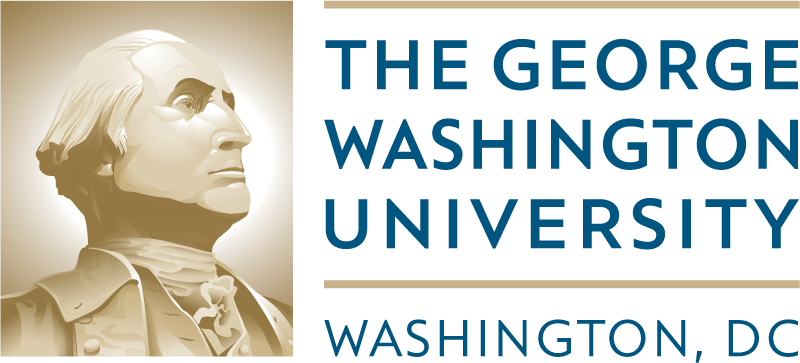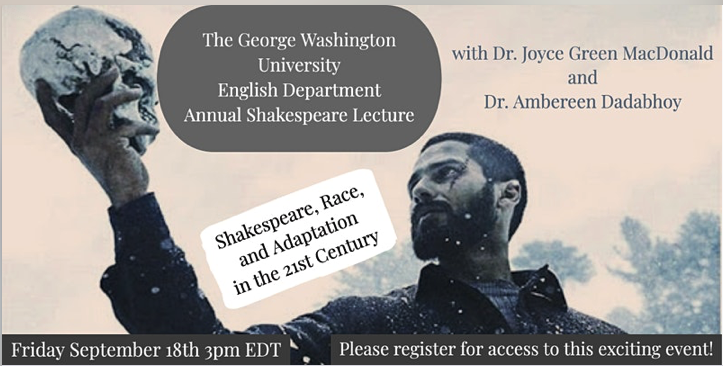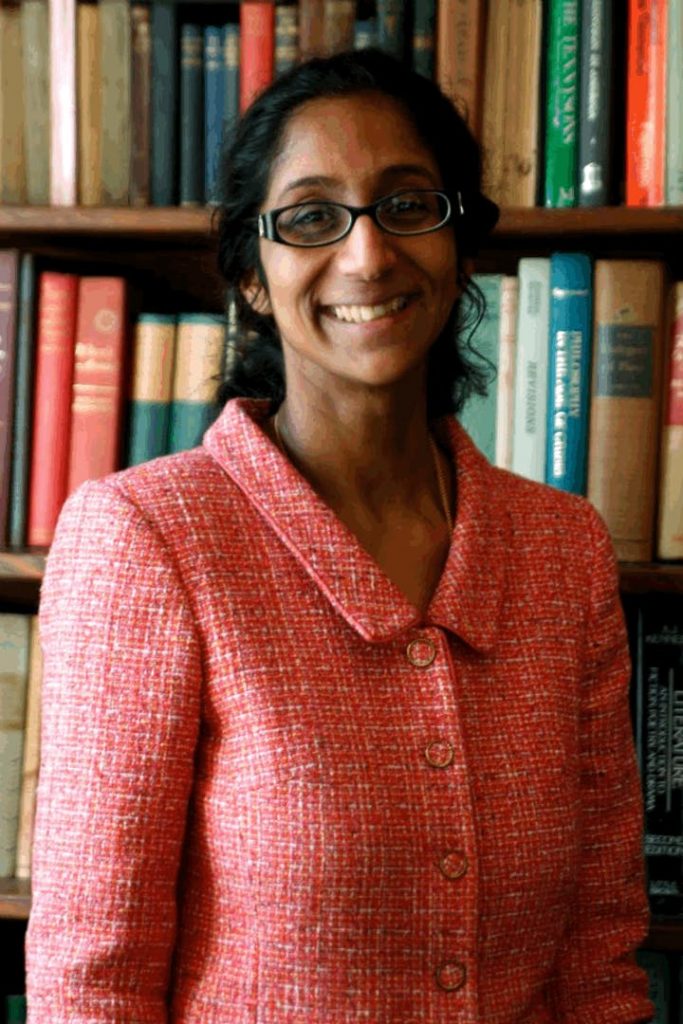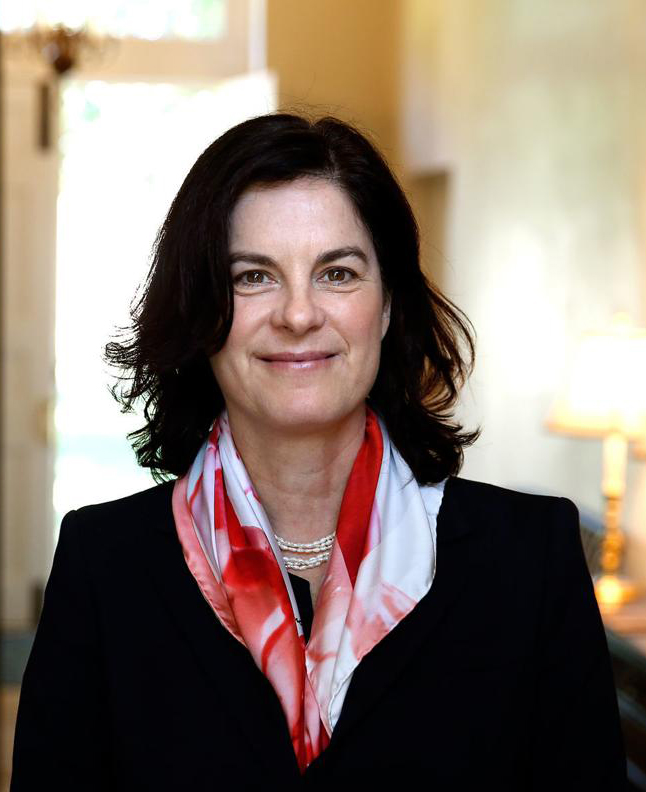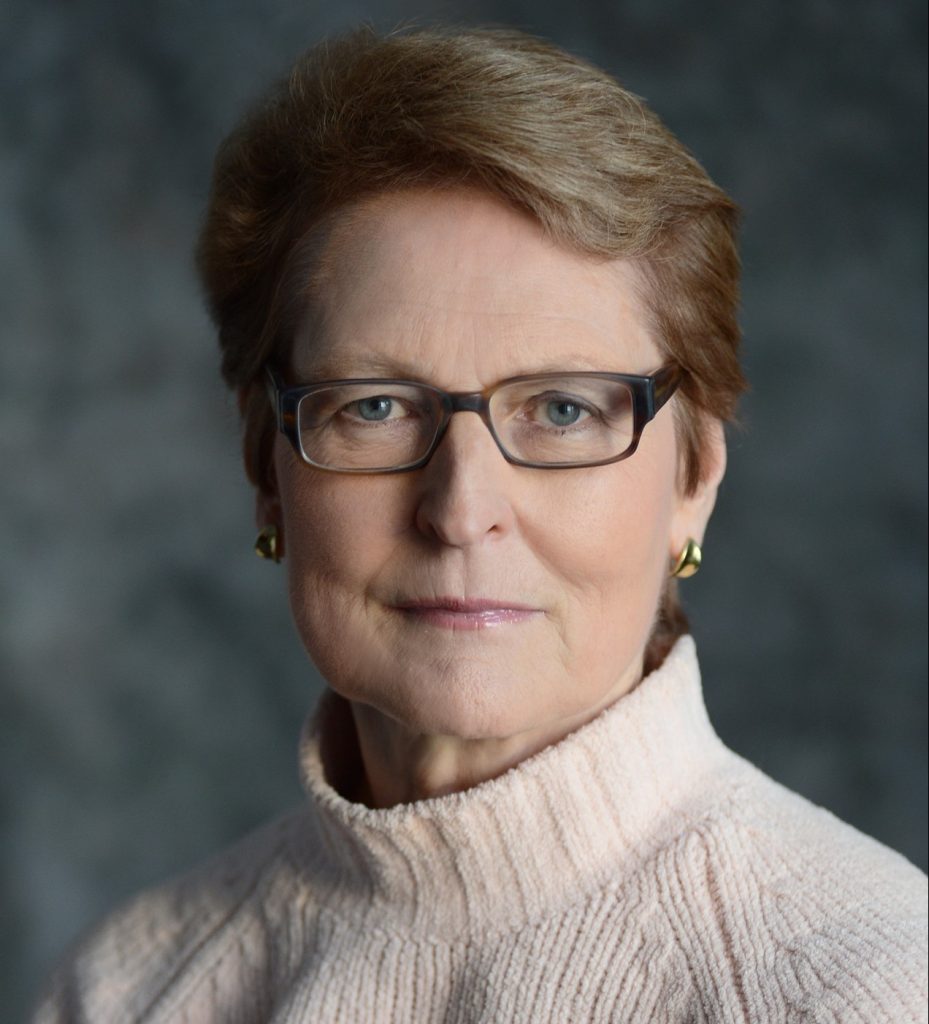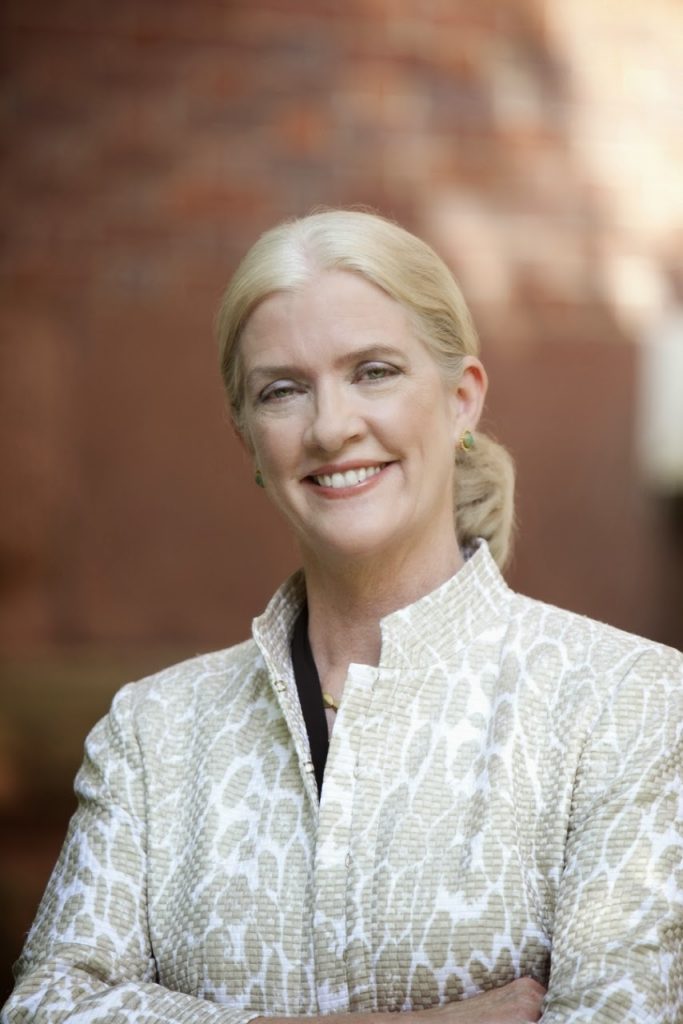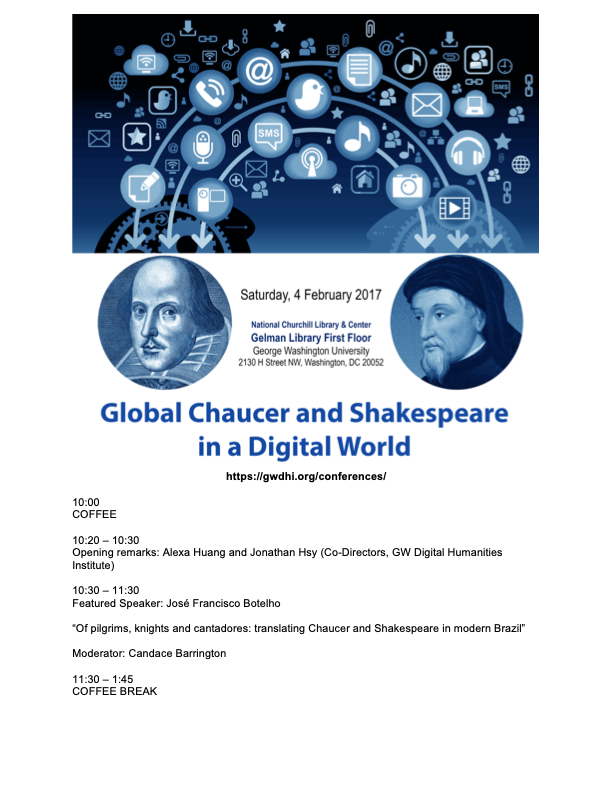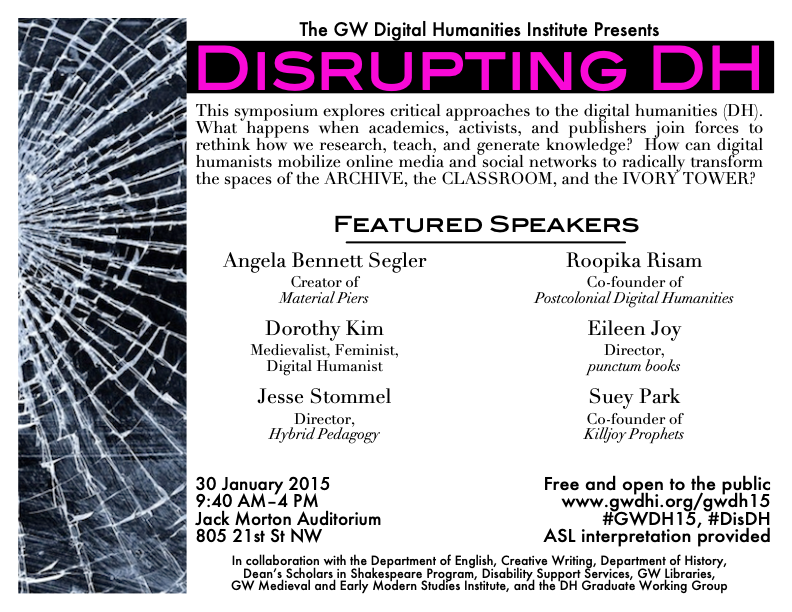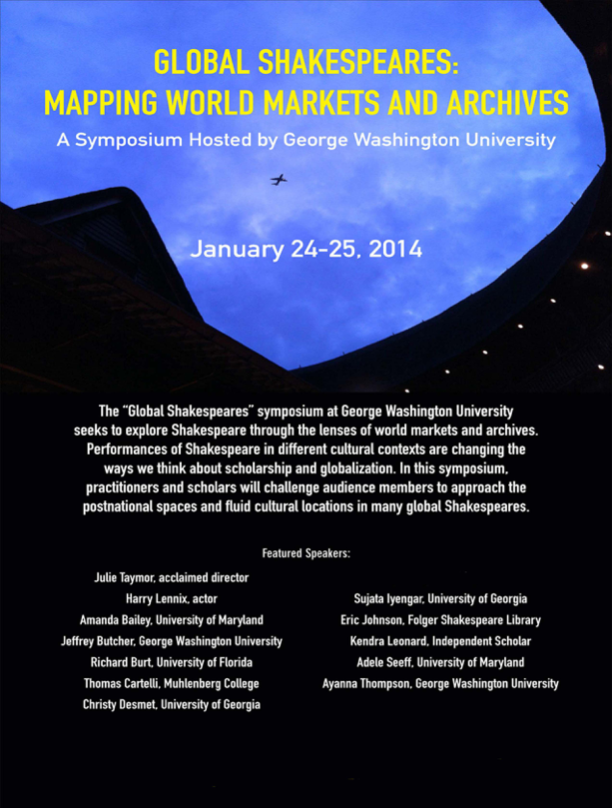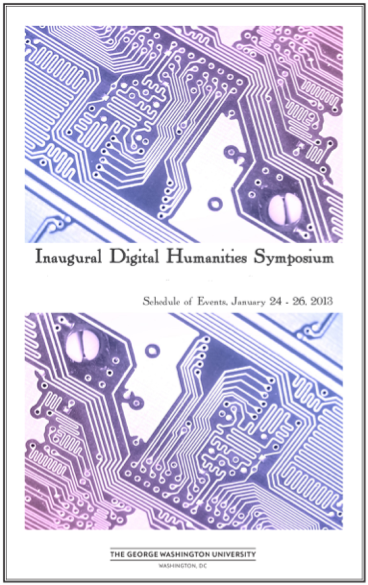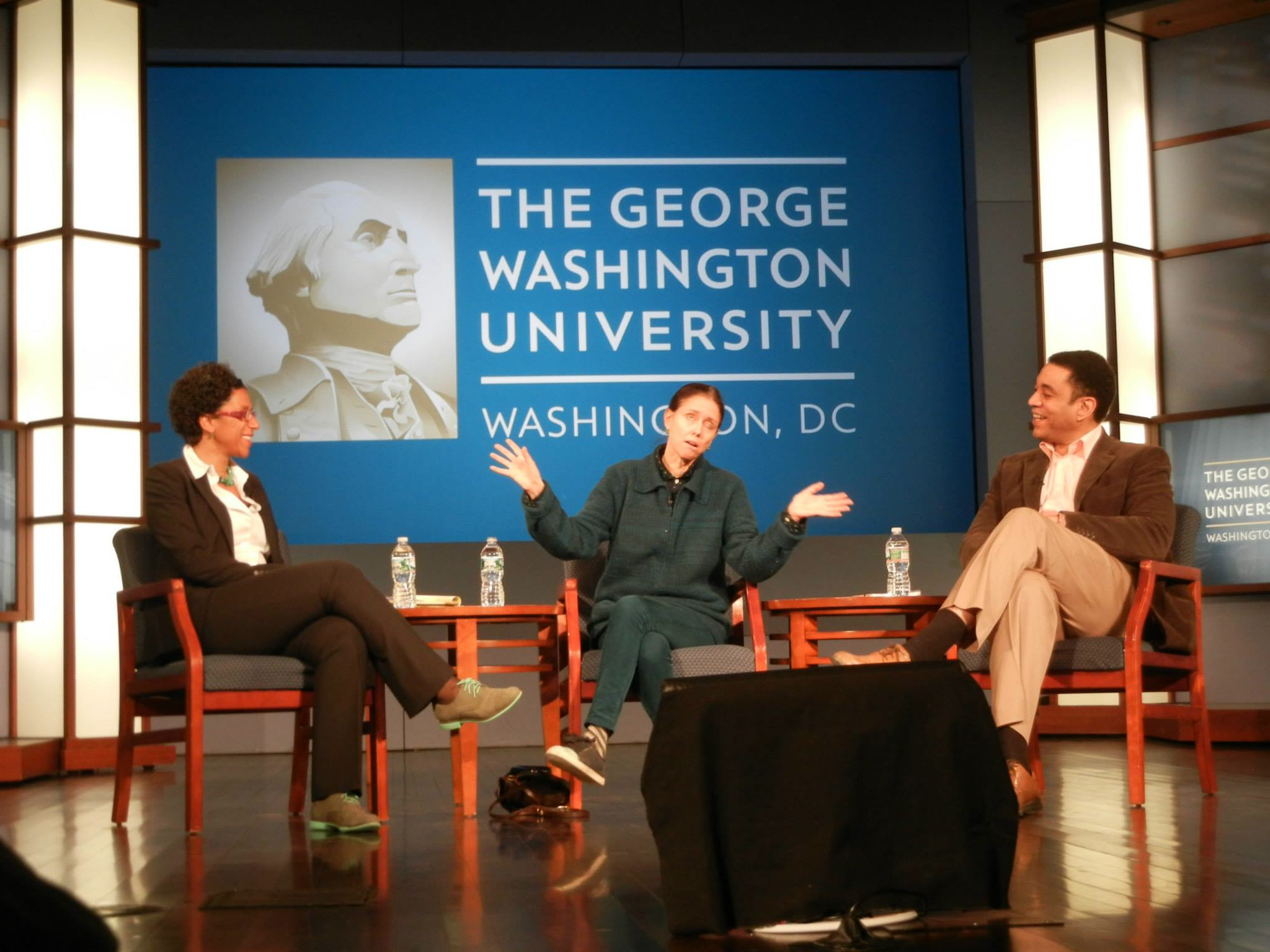
Unless otherwise indicated, all events listed are free and open to the public.
TALKS
Annual Shakespeare Lecture 2020: Shakespeare, Race, and Adaptation in the 21st Century
Joyce Green MacDonald (University of Kentucky) and Ambereen Dadabhoy (Harvey Mudd College)
Our speakers will explore how recent adaptations of Shakespeare construct and present race and what it means to adapt Shakespeare and other early modern texts in the 21st century. Watch the video recording here.
Annual Shakespeare Lecture 2019: Same-Sex Star-Crossed Lovers in Global Shakespearean Web-Series
Sujaya Iyengar, Professor of English at the University of Georgia; Director, Mobile Digital Editing Lab; and Co-founder and Co-editor of Borrowers and Lenders: The Journal of Shakespeare and Appropriation
Shakespeare’s legendary star-crossed lovers Romeo and Juliet have crossed time and space in the twenty-first century to emerge as same-sex couples in streaming web-series from Brazil, India, and the U.S.A. This lecture considers the changes that these film-makers, amateur and professional, make to the story and the power of streaming video to create new and culturally relevant adaptations of Shakespeare.
This lecture investigates the ways in which the tropes of parental disapproval and barriers between lovers (conventional in opposite-sex romances) are used to defuse the still-shocking portrayal of same-sex love.
Annual Shakespeare Lecture 2017: Monstrous Devices or Shakespeare Machines? Can Computers Read Hamlet for you?
Jonathan Hope is a professor at the University of Strathclyde in Glasgow, Scotland and a contributor to the Mellon-funded, interdisciplinary project Visualizing English Print.
This talk explores how computers, digital texts, data visualization, and statistics are changing the ways we read Shakespeare. How are Shakespeare’s plays different if we convert them into bags of words instead of books of pages or speeches on stages? What if we count the words instead of reading them? What if machines allow us to read everything his contemporaries printed at the same time we read Shakespeare? In doing so, Professor Hope shows how readily available tools can provide an “in” to texts that might surprise your professors and reveal how everything people tell you about Shakespeare’s inventive vocabulary is wrong.
Annual Shakespeare Lecture 2016: Virtual Globe Theatres: Playgoing in a Networked World
Katherine Rowe is Provost and Dean of Faculty at Smith College. She is the author of Dead Hands: Fictions of Agency, Renaissance to Modern, co-author (with Thomas Cartelli) of New Wave Shakespeare on Screen, and editor of Evans Shakespeare Edition of Macbeth. A scholar of literature and media history, she is co-founder of Luminary Digital Media, a social reading platform that is bringing literary works to mobile devices, including iPad apps of the Folger Library Shakespeare editions.
Co-sponsored by the Digital Humanities Institute, Department of English, and the Medieval and Early Modern Studies Institute, the George Washington University Annual Shakespeare Lecture brings to campus a prominent scholar each fall to shed new light on the intersections of literary studies and digital humanities.
Annual Shakespeare Lecture 2015: Countering the Lucrece Effect: The Performance of Rape on the Early Modern Stage
Jean H. Howard, George Delacorte Professor in the Humanities at Columbia University. She is the author of numerous books, including most recently the award-winning Theater of a City: The Places of London Comedy 1598-1642 (UPenn Press 2007) and Great Shakespeareans: Marx and Freud (Bloomsbury 2012) and she is one of the editors of The Norton Shakespeare: Based on the Oxford Edition.
The story of rape of the Roman matron, Lucrece, fascinated early modern writers. In this talk, Prof. Howard examines the various ways that Shakespeare and his fellow dramatists staged this violent event and in doing so opened up its complicated sexual and political meanings.
The English Department is pleased to announce that Professor Jean Howard will deliver this year’s Dean’s Scholars’ in Shakespeare Annual Lecture, a program founded by Alexa Alice Joubin.
Annual Shakespeare Lecture 2014: “What ist’ o’clock?”: Comic and Tragic Temporality in Shakespeare
Rebecca Bushnell is the President of the Shakespeare Association of America and professor of English at the University of Pennsylvania. She is the author of numerous books, including Green Desire: Imagining Early Modern English Gardens (Cornell University Press, 2003) and Tragedy: A Short Introduction (Blackwell, 2005) and the editor of Companion to Tragedy (Blackwell, 2005).
How do characters and audience experience time in Shakespeare’s plays and why does it matter? This lecture will pursue a general theory of comic and tragic time in performance, in The Comedy of Errors, Romeo and Juliet, Macbeth and Antony and Cleopatra. The Dean’s Scholars in Shakespeare Annual Lecture is designed for a broad audience. It is free and open to the public, and it will be followed by a reception.
Inaugural Digital Humanities Institute Lecture and the Dean’s Scholars in Shakespeare Lecture 2013
Addressing the Text: Reflections on Shakespeare, Digital Access, and Libraries by Michael Witmore
The talk will explore the ways in which large scale digitization projects have created new access problems while solving old ones; it will also show some underlying similarities between the physical codex and the digital surrogates that we are now creating for printed books: both are “massively addressable objects,” simply at a different scale. The plays of Shakespeare are only one place where this convergence can be explored; they will serve as a point of departure in this talk.
We are very pleased to announce the launch of a new Digital Humanities Institute, co-founded and co-directed by Alexa Alice Joubin and Jonathan Hsy. The inaugural Digital Humanities Institute lecture will be delivered by Michael Witmore, whose work on data-mining and literary analysis will provide an entry point into a discussion of some of the possibilities — and potential limitations — of large scale digitization projects. Focusing on digital culture and library research, Dr. Witmore’s talk promises to be very entertaining and accessible.
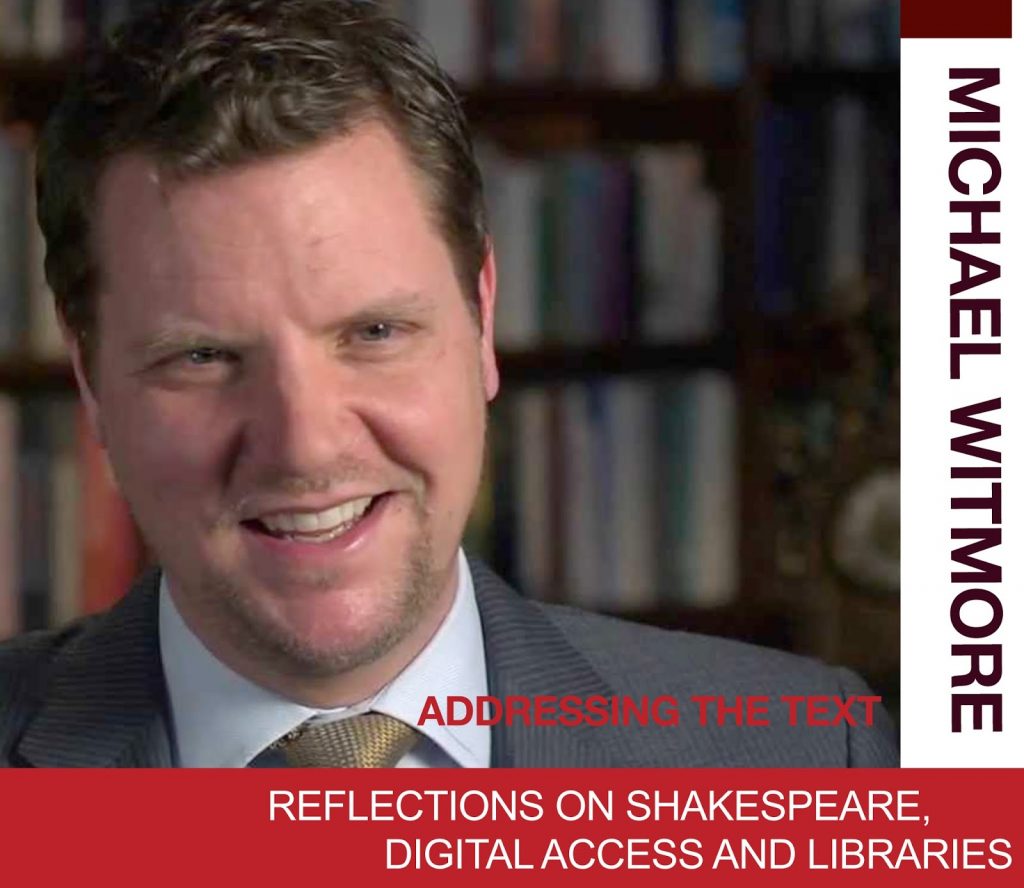
Michael Witmore, Director of the Folger Shakespeare Library and author, most recently, of Shakespearean Metaphysics and Landscapes of the Passing Strange: Reflections from Shakespeare (with Rosamond Purcell). He is part of the Mellon funded digital research initiative Visualizing English Print, 1470-1800 and maintains a blog on digital approaches to literary studies.
Inaugural Dean’s Lecture on Shakespeare 2012: Shylock, Othello, and the Theatrical Coding of Difference: Picturing Shakespeare at the Folger by Gail Kern Paster
Images of Shylock and Othello from the Folger Library database show how these figures of the Jew and the Moor as Others have been represented since the eighteenth century. These images also show how they have been presented for consumption and display. Setting images side by side has great heuristic potential for understanding the theatrical coding of difference in an historical trajectory. The talk is designed for a broad audience, and it will be followed by a reception.
Gail Kern Paster was named to the Queen’s Honours List as a Commander of the British Empire in May 2011. A professor of English at GW from 1974 until 2002, she has held fellowships from the Guggenheim and Mellon Foundations. Dr. Paster now serves on the board of directors of Gulfshore Playhouse.
The Dean’s Lecture on Shakespeare series will feature distinguished Shakespearean scholars and directors each year to bring cutting-edge works to the campus. Part of the purpose of this event is to welcome the Dean’s Scholars in Shakespeare to GW. Students in this new two-year, 16-credit program will be residing in Cole Hall and taking courses on Mount Vernon. The program was founded by Alexa Alice Joubin.
This inaugural lecture is co-sponsored by the Dean’s Scholars in Shakespeare Program and the GW Medieval and Early Modern Studies Institute.
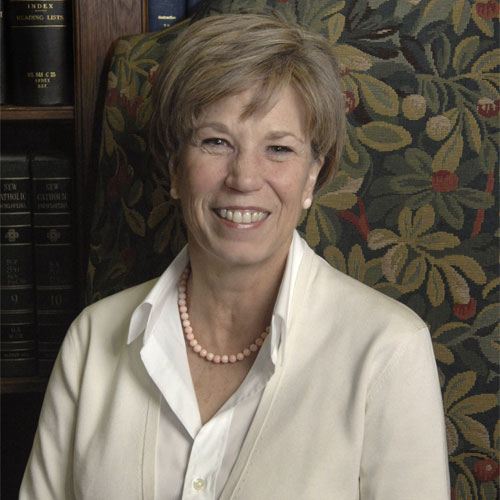
Former GW English professor and Director Emerita of the Folger Shakespeare Library, Gail Kern Paster, continues her work with the Folger as an editor of Shakespeare Quarterly. She is the author of three books, most recently Humoring the Body: Emotions and the Shakespearean Stage, as well as numerous other scholarly publications on early modern drama, with a focus on the cultural history of the body and its emotions. She is currently completing an electronic edition of Twelfth Night for the Norton Shakespeare.
Other Talks and Events
Public Interest Technology Showcase, April 15, 2021: featuring Alexa Alice Joubin, John Helveston, and Costis Toregas. The professional field of public interest technology is working to shape the way we think about technology to solve public problems in an inclusive and impactful manner. This cross-cutting field of research brings together disciplines such as engineering, data science, humanities, public policy and law.
GW Composing Disability Symposium April 7-8, 2016, featuring Alexis Lothian (UMD), Women’s Studies scholar focusing on fandom studies, speculative fiction, social justice, and digital media; David Perry (Dominican University), a disability journalist, activist, and author; Rachel Vorona Cote, a freelance writer; and Alice Wong (UCSF), Founder and Project Coordinator of the Disability Visibility Project (participating virtually). “Composing Disability” was co-sponsored by the GW Digital Humanities Institute, Disability Support Services, Department of English, GW Medieval and Early Modern Studies Institute, and University Writing Program.
Annual Digital Humanities Showcase, February 12, 2106. Co-sponsored by XD@GW (Office of Cross-Disciplinary Collaboration, directed by Diane H. Cline) and GW Libraries. Presenters representing Classics, The Elliott School, Corcoran School of the Arts and Design, Philosophy, Statistics, Health Sciences, the DC Africana Archives Project, and more.
XD@GW Faculty Cooperative launch event, December 10, 2015.
Open Access Salons hosted by GW Libraries, October 21 and 27, 2015.
Vexed Texts: Recoding Cultures, October 8, 2015. Interdisciplinary multimedia conversation co-organized by the Digital Humanities Institute and MEMO (Medieval Electronic Multimedia Organization). Participants: Alexa Alice Joubin (Co-Director, DH Institute); Anna Wilson (University of Toronto), Carol L. Robinson (MEMO), Kendra Preston Leonard (Director, Silent Film Sound & Music Archive), Biennial Meeting of the BABEL Working Group.
Transformative Digital Humanities: Doing Race, Ethnicity, Gender, Sexuality, Disability, and Class in DH” and THATCamp, University of Maryland, October 2-3, 2015.
Inaugural Digital Humanities Showcase, February 20, 2015. Organized by the Digital Humanities Institute with Shira Loev Eller (Art and Design Librarian, Gelman Library) and co-sponsored by GW Libraries and the CCAS Office of Cross-Disciplinary Collaboration. Participants from Classics, English, GW Libraries, History, Japanese, Jewish Cultural Arts, and the US Holocaust Memorial Museum]. Access presentation abstracts here.
Early Modern Recipes Online Collective (EMROC), Jan 12 -13, 2015, by Rebecca Laroche (University of Colorado-Colorado Springs).
Plagues, Witches, and War: A MOOC Postmortem by Bruce Holsinger (University of Virginia), December 5, 2014.
Interdisciplinary Panel on Writing and Publishing in LGBT Studies, October 31, 2014. Event moderated by Jonathan Hsy (Digital Humanities Institute); featuring Kimberly Acquaviva (Nursing), Lisa Bowleg (Applied Social Psychology), Robert McRuer (English), and Bonnie Morris (Women’s Studies).
The Social Networks of Socrates in Classical Athens: SNA and the Digital Humanities by Diane H. Cline (History), October 22, 2014.
Brown Bag Lunch on digital humanities, Naomi Schoenbaum, August 1, 2014.
Programming Workshop with Prof. Daniel DeWispelare (English), May 12, 2013. Organized by Maia Gil’Adi, for the English Graduate Student Association (EGSA)
THATCamp: The Humanities and Technology Camp, April 26, 2014. Read more about the event in this invitation (PDF or Word). Read more here on the GW Digital Humanities Institute website
Omeka Tutorial, featuring Patrick Murray-John (George Mason University), April 19, 2014. Organized by Tawnya Ravy.
Coding and Database Tutorial, April 5, 2014, with Prof. Daniel DeWispelare (English), organized by Maia Gil’Adi for EGSA.
Mermaids, Cables, and the Deep Sea: The Telegraphic Imaginary in the 19th Century by Claire Pettitt (King’s College, London), February 24, 2013
Teaching Digital Writing by Joe Harris (University of Delaware), February 18, 2013. Co-sponsored by the University Writing Program and Academy of Distinguished Teachers
Feb 20: #AltAc / #PostAc: Rethinking the PhD Job Search in the Humanities, February 20, 2013. Organized by Holly Dugan) and featuring Sarah Werner (Digital Media Strategist, Folger Shakespeare Library), Evan Rhodes (Executive Advisor, Corporate Executive Board), Meredith Hindley (National Endowment for the Humanities), Alyssa Harad (author and blogger); Miriam Posner (Digital Humanities Program Coordinator, UCLA). For more, listen to this podcast and follow Sarah Werner’s presentation online.
Freedom, Responsibility, E-Publishing, and Building New Cultural-Intellectual Publics by Eileen Joy (Director, punctum books), November 14, 2013. Read the full text of the talk here.
Digital Scholarship and Careers in the Humanities by Andrew Jewell (University of Nebraska-Lincoln), September 12, 2013.
